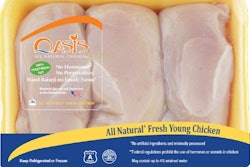
According to its annual results for the last fiscal year, Astral Foods generated lower profit before interest and tax, as well as profit before income tax year-on-year. This was despite an increase in sales of 4.6% to just over 14.1 billion rand (ZAR; US$917 million).
Compared with 2018-2019, overall reported profit for the year (ended September 30, 2020) was 13.3% lower at around ZAR782 million. While the firm reduced its administrative expenses, costs associated with distribution, marketing, and finance were all significantly higher this year.
At ZAR14.35, earnings per basic share is down 13.5% from the previous year, and earnings per diluted share will be 13.6% lower at ZAR14.32.
Business challenges
In its audited accounts, Astral Foods’ business is reported as three business units — Poultry, Feed, and Other Africa.
Compared to the group’s overall 4.6% improvement in revenue, its Feed division out-performed the Poultry business. At ZAR6.98 billion, revenue generated by animal feed sales was 6.2% higher year-on-year. In contrast, Poultry achieved a more modest increase of 4.3% at ZAR11.3 billion. The firm’s businesses in other African countries — Eswatini (previously known as Swaziland), Mozambique, and Zambia — generated ZAR482 million, a marginal year-on-year increase.
In terms of operating profit, Astral’s Feed division performed best in 2019-20, generating ZAR508 million, an increase of 3.8% from the previous year. For the other African countries, operating profit was up 60% at ZAR35 million, while this metric slumped by 20% for the group’s South African Poultry business to ZAR295 million.
The drop in Astral Foods’ overall profit was attributed to the relative weakness of the local currency, the rand, and to its effects on raw material costs by a report in Moneyweb.
Year of two halves for the Poultry Division
Higher broiler sales drove the increased revenue for Astral Foods, the company reports. Slaughter volume was up by 3.5% from the previous year, partly due to a water shortage that constrained production in the comparative period.
Start of the national lockdown linked to the coronavirus (COVID-19) pandemic in March of 2020 heavily impacted the group’s trading. Hospitality, restaurant and quick service restaurant (QSR) sectors had accounted for 20% of poultry meat sales prior to March. With these outlets closed, stocks of frozen product built up, and had to be sold at below production cost.
Accounting for 65% of the total costs of production, rising broiler feed prices added to the challenges faced by Astral’s Poultry division during the past year. Other expenses — directly related to COVID-19 as well as interruptions to water and electricity supplies during the fiscal year also impacted profitability. From 3.4% the previous year, operating profit margin for the group’s Poultry Division fell to 2.6%.
Higher prices benefit Feed Division sales
Astral Foods attributed the 6.2% increase in revenue of its Feed Division to the rise in feed prices that adversely impacted its poultry business.
While sales volume was only marginally higher year-on-year, operating profit increased 3.8%. Profit margin for the Division was hardly changed from 2018-19.
Latest investments in water sanitation, processing
Limitations on the national water supply continue to impact Astral Foods, particularly its poultry processing.
Although only about half of the cost in the previous year, water supply issues cost the group around ZAR62 million in the year just ended, reported Moneyweb.
According to Gary Arnold, managing director of agriculture for the firm, 120 truckloads of water had to be supplied to the plant at Standerton daily at the end of last year and the beginning of this year. Commissioning of a reverse-osmosis unit there in June of this year has helped ease those running costs in recent months. The unit cleans water from the processing plant to become potable water, he said.
A further investment by Astral in the past year has increased the firm’s processing capacity by 16%, said Arnold. At a cost of ZAR710 million, completion of a new plant at Olifantsfontein has added 800,000 birds per week to the company’s throughput of 5.2 million over the past financial year.
More on Astral Foods
Amid a series of challenges in the South African poultry meat sector, Astral Foods indicated to its shareholders earlier this month better-than-expected financial performance following a profits warning for the past year.
Previously, the firm had announced the resignation of Andrew Crocker as executive director, with effect from the end of January 2021. The move followed Crocker’s decision to emigrate from South Africa.
According to the Top Companies database from WATT Poultry, Astral Foods joint first place as the leading poultry meat producer in Africa. The firm’s annual output is reported as 260 million birds.

















